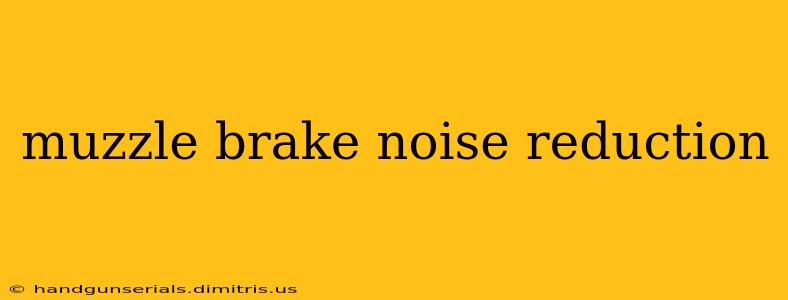Muzzle brakes are popular among firearm enthusiasts for their ability to reduce recoil and improve shooter control. However, their effectiveness often comes at the cost of significantly increased noise. This can be problematic for both the shooter and those nearby, leading to hearing damage and general discomfort. This comprehensive guide delves into the complexities of muzzle brake noise and explores various methods for mitigating its impact.
Understanding the Noise Problem
The loud report of a firearm equipped with a muzzle brake isn't simply louder than an unbraked firearm; it's a different kind of loud. The noise generated by a muzzle brake is a result of several factors:
-
Redirected Gases: Muzzle brakes work by redirecting propellant gases to the sides or rear of the barrel. This redirection creates additional pressure waves that contribute to the overall sound intensity. These pressure waves aren't just louder, they're often perceived as harsher and more unpleasant.
-
Increased Blast: The gases escaping from the ports of the muzzle brake create a powerful blast wave that directly impacts the surrounding environment. This can be particularly problematic in enclosed spaces or areas with poor acoustics.
-
High-Frequency Sounds: The complex interaction of gases escaping from the muzzle brake creates high-frequency components in the sound signature, which are particularly damaging to hearing.
Methods for Noise Reduction
While completely eliminating the extra noise produced by a muzzle brake is impossible, several strategies can significantly reduce its impact:
1. Muzzle Brake Design
The design of the muzzle brake itself plays a crucial role in noise generation. Some designs are inherently quieter than others.
-
Conical vs. Linear Ports: Conical ports tend to be quieter than linear ports because they direct the gases more efficiently, reducing the overall blast wave.
-
Number and Size of Ports: The number and size of ports affect gas flow and pressure. Generally, fewer, larger ports are less noisy than numerous, smaller ports. This is because fewer, larger ports lead to smoother, less chaotic gas expulsion.
-
Materials and Construction: The material and construction of the brake also influences noise levels. Some materials might absorb or dampen sound more effectively than others, although this is usually a less significant factor than port design.
2. Suppressors (Silencers)
A suppressor, often mistakenly called a silencer, is the most effective method for reducing noise from a firearm, regardless of whether it's equipped with a muzzle brake. Suppressors work by slowing down and dissipating the expanding gases, dramatically reducing sound intensity.
It is important to note that the combination of a suppressor and a muzzle brake can sometimes offer synergistic noise reduction, though this depends significantly on the specific designs involved. In some cases, combining the two can even lead to increased noise.
3. Environmental Factors
The environment in which a firearm is discharged plays a significant role in perceived noise levels.
-
Shooting Range Acoustics: Shooting ranges with appropriate sound-dampening features, like baffles and earth berms, can reduce the overall noise experienced by shooters and bystanders.
-
Outdoor vs. Indoor Shooting: Shooting outdoors, particularly in open spaces, significantly reduces the impact of muzzle brake noise compared to indoor shooting.
4. Hearing Protection
Regardless of the muzzle brake and any other noise mitigation efforts, hearing protection is crucial. High-quality hearing protection, such as electronic earmuffs or custom-molded earplugs, should always be used when shooting firearms.
Conclusion
While muzzle brakes offer significant advantages in terms of recoil reduction and shooter control, they inevitably increase noise levels. By carefully considering muzzle brake design, utilizing suppressors when possible, selecting appropriate shooting environments, and consistently using hearing protection, shooters can significantly mitigate the negative impact of increased noise. Remember, hearing protection should always be prioritized to safeguard hearing health.

